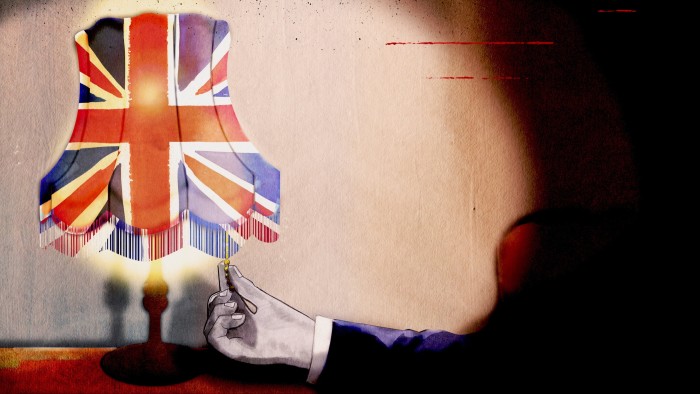Unlock the Editor’s Digest for free
Roula Khalaf, Editor of the FT, selects her favourite stories in this weekly newsletter.
“Will the last person to leave Britain please turn off the lights?” That was the Sun’s infamous headline, in 1992, which Neil Kinnock blamed for his losing the election to John Major. It came to my mind again this week when Kinnock popped up and floated the idea of a wealth tax — something Downing Street didn’t rule out. If Britain really is going back to the 1970s, to rolling strikes and heavy taxes and a visit from the IMF, could we please just fast-forward to the end now?
Sir Keir Starmer’s difficulties are not all of his own making. But too many are self-inflicted. In trying to get skittish MPs to back reforms to welfare, Number 10’s bully boy tactics have backfired. Rachel Reeves’ taxes have prompted a brain drain. The cave-in on winter fuel allowance, the bungs to train drivers and other public sector workers, mean that every lobby group will now try its luck. If the rhetoric about “tough choices” was dispiriting to some; the failure to make any is even more so.
The next election is now up for grabs. And a space has opened up in British politics. Labour seems locked into a tax and spend doom loop. Nigel Farage, leader of Reform UK, has jettisoned his old libertarianism and made a decisive leftward move on the economy. There is no one now running convincingly on a platform of fiscal responsibility, growth and enterprise, offering a vision that is worth sharing the pain for.
Many political strategists think there are no votes in spending restraint. They believe we voters will always prefer the magic money tree. I’m not so sure. Middle-class taxpayers are feeling brutally squeezed. And voters want stability, not noise about bond markets.
Farage is betting that he can become prime minister by leaning right on culture and left on economics. He is calling for reindustrialisation and the nationalisation of water, energy and rail. (Labour’s performative “rescue” of British Steel was a direct response to this). He’s also outflanking Starmer on welfare by calling for the two-child benefit cap to be scrapped: which would cost even more money.
In drawing voters from both Labour and the Conservatives, Farage is attempting to resurrect the kind of electoral coalition which swept Boris Johnson to power.
The irony is that Johnson’s careless, cake-ist reign created Farage’s opportunity, as well as some of the mess which Starmer’s government is struggling to clear up.
It was Johnson who brought in record numbers of immigrants (and did so without, according to the Public Accounts Committee, any proper scrutiny of the consequences). It was Johnson who overspent on furlough, HS2 and a failed test and trace system, and who delighted in — to quote his own words in another context — “spaffing money up the wall”. And it was Johnson who weakened the welfare rules painstakingly crafted by Iain Duncan Smith under David Cameron, which got 1mn people back into work between 2010 and 2020.
When Kemi Badenoch shouts about the “broken” welfare system, she ought to admit who broke it. She is right to demand a return to face-to-face assessments. But the Conservatives opposed Starmer’s attempts to reform both welfare benefits and the winter fuel allowance. Had they been grown-ups, a responsible party of potential government, they should have supported him.
The Conservatives predicament is dire. Liz Truss shredded the party’s reputation for economic competence. Johnson appalled the public with his manifest disregard for the law. The Liberal Democrats have hoovered up old Tory heartland voters who voted Remain and dislike the culture wars. And Farage is more convincing on immigration. The latest Tory defector to Reform, Sir Jake Berry, says it is “challenging the old order”.
A corrosive aspect of today’s Britain, which is eating away at our national soul, is the feeling that the system is rigged; that everyone is getting away with it. Water companies have spent years spilling sewage into rivers, apparently impervious to regulation. The postmasters still haven’t been paid. Supermarkets and chemists are plagued with shoplifters and luxury flats are being built for international residents who barely set foot in Britain, while Generation Rent is priced out. Some profit-making special needs schools, the next battle looming for Starmer, are charging £61,500 per child.
There’s a lot to be angry about; but fixing it requires a level of skill this government has not yet shown. Starmer is not interested enough in policy detail. In meetings, I’m told, he asks for solutions not problems. But in our system, the most intractable problems end up on the prime minister’s desk.
Getting the public finances under control, and boosting growth, requires bold decisions. It means making big bets on a few growth industries, not sprinkling too little everywhere. It means changing the way we price electricity to help industry, which wouldn’t derail net zero. It means ending the unsustainable triple-lock pension. If Labour, with a big majority and a young electorate, can’t do that, who will?
Britain still has great fundamentals: just ask any American who has relocated from Washington. If our moroseness is out of sync with our actual capabilities, it’s partly because we are weary of political drama. There is a hunger for stability, and hope.
The big divide in politics, according to Luke Tryl of the pollster More In Common, is between people who “want to burn it down” and those who prefer incremental change. I’d settle for competence.
It’s going to be a long four years.



